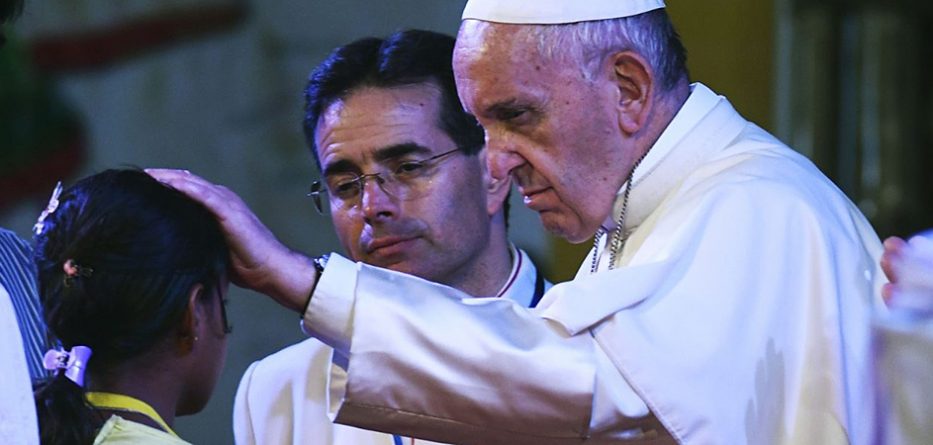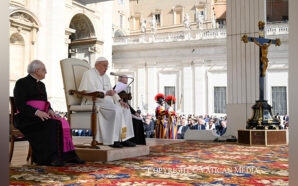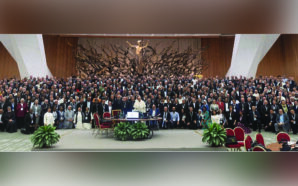Homily for the Third Sunday of Advent – Gaudete Sunday
Readings: Isaiah 61: 1-2, 10-11; Luke 1: 46-50, 53-54; 1 Thessalonians 5: 16-24; John 1: 6-8, 19-28
Mass for Installation of Parish Pastoral Council at St Canice’s Parish, Kings Cross/Elizabeth Bay
13 December 2020
Today’s Entrance Antiphon at Mass is: “Rejoice in the Lord always; again I say, rejoice. Indeed the Lord is near.” In Latin, the antiphon commences with the word ‘Gaudete’ which means ‘Rejoice’. That’s why this is called Gaudete Sunday – the Sunday mid-way through our Advent waiting and preparation for Christmas. The liturgical purple of fasting and penance is temporarily suspended. The priest wears rose coloured vestments which, like rose coloured glasses, help us to put a more joyful spin on our surroundings and our world.
LISTEN: https://soundcloud.com/frank-brennan-6/homily-for-gaudete-sunday-131220
Last Sunday, I went with a friend to Manly Beach. Walking along the Corso we saw about 60 board riders out there on the water waiting, just waiting, for that wave – the wave that would sweep them up and carry them to shore, making the waiting all worthwhile. It’s a great Advent image. Here are we Christians waiting for the Lord at Christmas, rejoicing because we know the Lord is near. In today’s second reading, Paul tells the Thessalonians: “My brothers and sisters, rejoice always, pray without ceasing, give thanks in all circumstances; for this is the will of God in Christ Jesus for you.”
The beach scene at Manly was all the more joy-filled because on this first weekend of summer people were gathered in numbers which had not been allowed during the COVID lockdown. It was just so natural for people to be gathered in such numbers enjoying the sun, the freedom and each other’s company. And yet, such gatherings would still be folly in other parts of the world where the virus is running rampant. What a blessing to be able to gather. That’s part of our rejoicing this Gaudete Sunday 2020 – the joy of being able to gather together naturally for worship after so many months of isolation attending Mass by Zoom or not at all. It’s good for us to be here. We pray with Paul amongst the Thessalonians: “may your spirit and soul and body be kept sound and blameless at the coming of our Lord Jesus Christ.”
Last Sunday, I took my first swim in the surf for summer. The water is still a little brisk on first entry. But then it is so refreshing and restorative. This Gaudete Sunday, we are being invited to take the plunge as we hear in the first reading from Isaiah:
“The spirit of the Lord God is upon me,
because the Lord has anointed me;
he has sent me to bring good news to the oppressed,
to bind up the broken-hearted,
to proclaim liberty to the captives,
and release to the prisoners;
to proclaim the year of the Lord’s favour.”
Here at St Canice’s, we are inducting a new parish pastoral council today. This is one of those local practical steps available to us all as we prepare for the first assembly of the Plenary Council in October next year. The International Theological Commission of our Church has said:
“In the parish, there are two structures which have a synodal character: the parish pastoral council and the financial council, with lay participation in consultation and pastoral planning. In this sense, it seems necessary to review the canonical norm which at present only suggests that there should be a parish pastoral council and to make it obligatory, as the last Synod of the Diocese of Rome did. Bringing about an effective synodal dynamic in a local church also requires that the diocesan pastoral council and parish pastoral councils should work in a coordinated way and be appropriately upgraded.”[1]
So maybe here at St Canice’s you are getting ahead of the wave, instituting a parish pastoral council which can then feed into an archdiocesan pastoral council which will both animate and be animated by the deliberations of the forthcoming Plenary Council. We congratulate the members of the parish pastoral council and wish you well as you discern how to bring Good News to the oppressed, proclaiming the Lord’s year of favour. You will find that there is a time to speak and a time to keep silent, a time to act and a time to refrain from acting. With your priests, you will be able to discern parish directions and actions. You will need to pick your issues. You will need to pick your moment. You will need to set priorities. Heed the words of Paul to the Thessalonians: “Do not quench the Spirit. Do not despise the words of prophets, but test everything; hold fast to what is good; abstain from every form of evil.”
Pope Francis reminds us that synodal ministry should “involve a ‘journeying together’ that values ‘the charisms that the Spirit bestows in accordance with the vocation and role of each of the Church’s members, through a process of co-responsibility… Motivated by this spirit, we can move towards a participatory and co-responsible Church, one capable of appreciating its own rich variety, gratefully accepting the contributions of the lay faithful… No one should be excluded or exclude themselves’.”[2]
No matter how hard we try, we will not satisfy everyone and we won’t always get things right. Not even the Pope can do that! This past week, Pope Francis has come in for quite a deal of criticism for his continued silence over human rights abuses by the Chinese Government. He, like all of us, has to discern when to speak and when to remain silent. He and his advisers have been walking on eggshells these past two years finalising an agreement with the Chinese government, carving out the space for an appropriate mode of appointment for bishops. But to do this, Francis has decided that he needs to soft-pedal any public objection to Chinese human rights abuses.
In the past, Francis has said a prayer during the Sunday Angelus for persecuted groups like the Rohingya in Myanmar or the Yazidi in Iraq. But he has never done this for the Uyghurs in China. In his new book Let Us Dream: The Path to a Better Future, Francis speaks of the need to see the world from the peripheries, from places “of sin and misery, of exclusion and suffering, of illness and solitude.”. Being interviewed by his biographer Austen Ivereigh, he says: “I think often of persecuted peoples: the Rohingya, the poor Uyghurs, the Yazidi — what ISIS did to them was truly cruel — or Christians in Egypt and Pakistan killed by bombs that went off while they prayed in church.”[3] This has been his first public mention of the Uyghurs. Has he said enough? Has he done enough? Is he being consistent? His critics think not.
This past week Jimmy Lai a prominent Catholic in Hong Kong was imprisoned. Lai is a billionaire newspaper proprietor who has been very critical of the mainland Chinese Government. Many see his arrest as being politically motivated. Lai’s godfather William McGurn is a prominent columnist for the Wall Street Journal. McGurn is a Republican and one of the more respected conservative commentators in the US. Writing his regular column in the Wall Street Journal this week, McGurn lamented:
“Alas, Pope Francis not only chooses to see no evil in China, he won’t hear of any, either. In September, Cardinal Zen flew to Rome on his own initiative to talk to Pope Francis about what Beijing was doing to the Catholic faithful in Hong Kong and China. Pope Francis refused to see him. Yet later the pope did find the time to discuss justice and inequality with an NBA players union delegation, which presented him with a Black Lives Matter T-shirt.”[4]
When Pope Francis went to Myanmar three years ago, everyone was waiting to see how he would deal with the military leaders and what he would do or say about the Rohingya – the Muslim refugees who were being displaced across the border in their hundreds of thousands by the military. Pope Francis gave a very measured address to the military leaders speaking about all the right ideals – democracy, peace, justice and human rights. He said that no one should be excluded. But he did not mention the Rohingya by name. His critics, especially those in the western media, said, “There you go. He is a leader with feet of clay. He dare not offend the military because he wants to protect his own Christian minority in this largely Buddhist country under military rule.” He then went next door to Bangladesh. He asked to meet with some of the Rohingya refugees. He openly wept. In company with other religious leaders, including some imams, he prayed with them. His last words in his last public appearance were: “The presence of God, today, is also called Rohingya.”
On the plane on his way home to Rome, Pope Francis gave a press conference. He told the journalists, “I knew that I would be meeting the Rohingya. I knew neither where nor how, but that this was a condition of the journey.” When asked why he did not mention the Rohingya when in Myanmar, he explained, “I saw that in the official address [in Myanmar] had I said that word, I would have been slamming the door in someone’s face But I described the situations, the rights of citizenship, ‘no one excluded’, to enable myself to go further in private meetings. … I did not have – so to speak – the pleasure of slamming the door in someone’s face, publicly, a condemnation, no. But I had the satisfaction of having a dialogue, of allowing the other person to speak, of saying what I had to say and in this way got the message across.”
The spirit of God alive in us as the Church community allows us to bridge gaps and to speak and listen respectfully even with those with whom we passionately disagree and for the best of reasons. Timing can be everything. It can be important to pick the moment. Thus the need for a truly synodal parish council which can discern the issues of the time and place which require our attention. Remember, you can’t do everything. And your armchair critics can always allege that you are hypocrites for triumphing one cause and not another. That’s no excuse for consistently doing nothing for any cause other than your own.
Three years on, it’s good to note Pope Francis’s observation: “When last year, in Abu Dhabi, I was given an award – it was a significant sum – I had it sent straight to the Rohingya: a recognition of Muslims by other Muslims.”[5] Francis has picked his moment for the Rohingya. He has not yet picked his moment for the Uyghurs or the pro-democracy protesters in Hong Kong.
As we wait joyously and expectantly for Christmas, we take heart from those words of Isaiah in today’s first reading:
“For as the earth brings forth its shoots,
and as a garden causes what is sown in it to spring up,
so the Lord God will cause righteousness and praise
to spring up before all the nations.”
We won’t put the world right by Christmas. We won’t even put the parish right by Christmas. But as we joyfully wait on Gaudete Sunday, we delight in the grace that we have it in our grasp to put some things right, and so we should. Let’s ride that wave together.
Fr Frank Brennan SJ is the Rector of Newman College, Melbourne, the Distinguished Fellow of the P M Glynn Institute, Australian Catholic University, and the former CEO of Catholic Social Services Australia (CSSA).
[1]International Theological Commission, Synodality in the Life and Mission of the Church, 2018, [84] at http://www.vatican.va/roman_curia/congregations/cfaith/cti_documents/rc_cti_20180302_sinodalita_en.html
[2] Pope Francis, Christus Vivit: Post-Synodal Exhortation #206, quoting the Final Document of the Fifteenth Ordinary General Assembly of the Synod of Bishops
[3] Pope Francis, Let Us Dream: The Path to a Better Future, Simon and Schuster, 2020, p. 122018
[4] William McGurn, ‘The Silence of Pope Francis’, Wall Street Journal, 7 December 2020
[5] Ibid.








